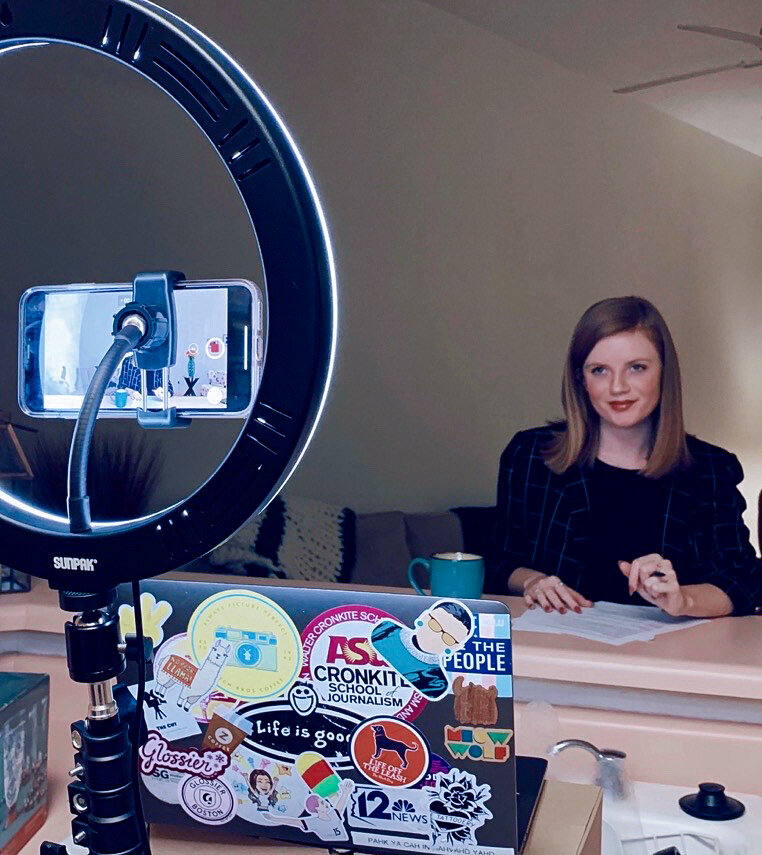Working from Home as a Student and Journalist
A little over a week before the world went on lockdown, I filmed an explainer story about the coronavirus. It was supposed to be reassuring - reassuring that everything was going to be okay.
I drove two hours to talk with a microbiologist known as “Dr. Germ,” who told me that it was never a matter of if with the coronavirus, only when. He told me the proper way to wash your hands, your phone, and your countertops. He told me how it spreads and how it survives. He told me we had been here before. Foolishly, it seemed so simple. It seemed manageable. It seemed finite.
The next day I got a text from a friend who said her school was switching to online classes for the rest of the semester. “I don’t know what to do,” she said. I didn’t know what to say. I felt lucky to be so clueless.
Then it was another friend who called me on my way home. “I don’t think I can be back in my hometown for that long,” he said. I sympathized, but I didn’t know.
And then, it was me. As a reporter, I wondered how I would move forward and with the same quality of work. I wondered if I could. As a student, I asked myself how my friends would get home on such short notice or how they would adapt after losing their on-campus jobs. Who was going to help them? Who even had a say? Other friends were worried about missing their graduation, their senior prom, their spring break vacations. I was worried about being away from the studio, my equipment, my professors. Some people told us we were selfish, others told us to let it hurt. I’m still not sure who I believe.
As so many people struggled to stay busy at home, I had to get to work. Every journalist did (all hail “essential” professions). If you did not eat, sleep, and breathe the coverage, you were sure to miss something: How are the elderly affected? When will grocery stores catch up? How is travel changing? Will students be able to graduate on time? Who will lose their jobs? Will the economy ever recover? The list of questions goes on and on and on, but the list of answers never seemed to match up. So, we try to make up for what we don’t know and the coverage gets broader and broader: Who are the helpers? Why are children covering the sidewalks in chalk? Who is donating what they can? Who is running toward the fire and not away?
Who is running toward the fire and not away? I have asked myself that question a hundred times and I wanted, more than anything, to be included on that list. Which brings me to where we are now (roughly). On Tuesday, March 24, 2020, Cronkite News made history. After three days of trial and error with my friends and colleagues Tina Giuliano and Veronica Galvin, we released a completely virtual, at-home newscast with anchors, graphics, weather, commercials...the whole thing. I am still beaming just thinking about it.
It was a lot of hard work, a lot of failure and a lot of “let’s try this again,” but we did it. My “studio” consisted of a ring light tripod on a step-stool in my kitchen and a teleprompter website on my laptop...which is not pretty, but functional. To record, we use our iPhones and edit on our personal laptops, replacing meetings and brainstorming sessions with FaceTimes and Zooms. Other students have turned in packages with stand-ups from their rooms, interviews via video chat and weather updates using graphics on their televisions. It has been inspiring and a lesson in what it means to make the best of a bad situation. We lost familiarity, but we never lost possibility. We made the best of it. We made history.
As for my job at The Arizona Republic, the at-home lifestyle is equally as sufficient, but again, it can feel like the work will never get done. Every single day we get hundreds of emails from people sharing their stories, asking their questions, raising their concerns and even expressing their disdain. We expect that as journalists, but this unchartered territory makes it especially unsettling. Here’s why: Journalists didn’t close schools. We didn’t tell you to buy masks and hand sanitizer in bulk. We didn’t say you should stock up on food for a month. We didn’t put you on lockdown. We never asked you to panic. We asked you to listen to the experts and handed you their expertise on a silver platter. We are trying to figure this out while living through it for the first time - just like you.
Even with that being said, we tried our best not to jump into this blindly. I have been in countless staff and editorial meetings about to handle these stories to the best of our ability. How to be honest and fair, even when there is no way to know the outcome. There are decisions to make not only about coverage but about how to operate a newsroom when you’ve run out of the things that made it a newsroom in the first place. We lost our studio...what now? We lost our equipment...what now? I take the “what nows?” with me. We all do. But we try to solve them the best we can. We try.
I was really worried when this all started. It felt like so many people were talking at once that anything I said would either add to the noise or be drowned out by it. That may be the case, but it’s still important work. It’s still important to be able to look back on this and be able to say you showed up. Where we stood when this is all said and done may be the most important thing about it. After all, we’re making history here. We’re making history all the time.
For more tips and tricks about Homeworking & Homeschooling due to COVID-19, check out this awesome article from MindGenius!
Meet the Author, Jamie Landers
Jamie Landers is pursuing a degree in journalism from The Walter Cronkite School of Journalism and Mass Communications. Her passion for the news industry and the art of storytelling continues to grow with each new opportunity. She shares her experience as a budding journalist in the real world to inspire other students and help teachers better prepare their pupils for the field.



